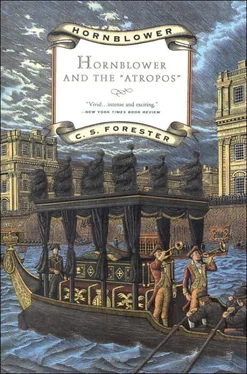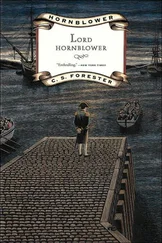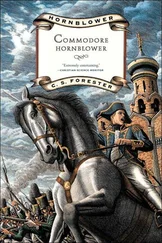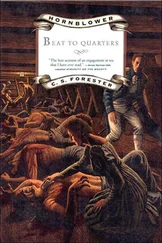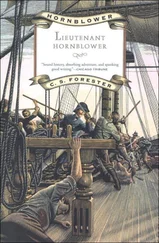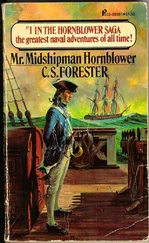“Keep ‘er goin’, sir,” he repeated.
So they went on through the darkness, in the strangest sort of mesmeric nightmare, suspended in utter blackness, utterly silent, for their speed was not sufficient to raise a ripple round the Queen Charlotte ’s bows. Hornblower went on thrusting with his feet, urging his aching legs into further efforts; he could tell by the sensations conveyed through the soles of his shoes that the tunnel was no longer bricklined—his feet pressed against naked rock, rough and irregular as the tunnellers’ picks and gunpowder had left it. That made his present employment more difficult.
He became aware of a slight noise in the distance—a low muttering sound, at first so feeble that when he first took note of it he realized that he had been hearing it already for some time. It gradually increased in volume as the boat crept along, until it was a loud roaring; he had no idea what it could be, but as the steersman beside him seemed unconcerned he decided not to ask about it.
“Easy a minute, sir,” said the steersman, and Hornblower, wondering, rested his aching legs, while the steersman, still recumbent, fumbled and tugged beside him. Next moment he had dragged a tarpaulin completely over both of them, except for their feet protruding from under the edges. It was no darker under the tarpaulin than outside it, but it was considerably stuffier.
“Carry on, sir,” said the steersman, and Hornblower recommenced pushing with his feet against the wall, the roaring he had heard before somewhat muffled by the tarpaulin. A trickle of water volleyed loudly on the tarpaulin, and then another, and he suddenly understood what the roaring was.
“Here it comes,” said the steersman under the tarpaulin.
An underground spring here broke through the roof of the tunnel and tumbled roaring into the canal. The water fell down on them in deafening cataracts. It thundered upon the roofs of the cabins, quite drowning the cries of the women within. The weight of its impact pressed the tarpaulin upon him. Then the torrent eased; fell away to trickles, and then they were past it.
“Only one more o’ those,” said the steersman in the stuffy darkness beside him. “It’s better arter a dry summer.”
“Are you wet, Horatio?” asked Maria’s voice.
“No, dear,” said Hornblower, the simple negative having the desired cushioning effect and smothering further expostulation.
Actually his feet were wet, but after eleven years at sea that was not a new experience; he was much more concerned with the weariness of his legs. It seemed an age before the next trickling of water and the steersman’s “Here it comes” heralded the next deluge. They crawled on beyond it, and the steersman, with a grunt of relief, dragged the tarpaulin from off them. And with its removal Hornblower, twisting his neck, suddenly saw something far ahead. His eyes were by now accustomed to the darkness, and in that massive darkness, incredibly far away, there was something to be seen, a minute something, the size apparently of a grain of sand. It was the farther mouth of the tunnel. He worked away with his legs with renewed vitality. The tunnel opening grew in size, from a grain of sand to a pea; it assumed the crescentic shape to be expected of it; it grew larger still, and with its growth the light increased in the tunnel by infinitesimal gradations, until Hornblower could see the dark surface of the water, the irregularities of the tunnel roof. Now the tunnel was bricklined again, and progress was easier—and seemed easier still.
“Easy all,” said the steersman with a final thrust.
It seemed unbelievable to Hornblower that he did not have to work his legs any more, that he was emerging into daylight, that no more underground springs would cascade upon him as he lay suffocating under a tarpaulin. The boat slowly slid out of the tunnel’s mouth, and despite its slow progress, and despite the fact that outside the sun shone with only wintry brilliance, he was quite blinded for a while. The chatter of the passengers rose into a roar almost comparable with the sound of the underground spring upon the tarpaulin. Hornblower sat up and blinked round him. There was a horseholder on the towpath with a pair of horses; he caught the line the steersman tossed to him and between them they drew the boat to the bank. Many of the passengers were leaving at this point, and they began to swarm out at once with their packages and their chickens. Others were waiting to board.
“Horatio,” said Maria, coming out of the firstclass cabin; little Horatio was awake now and was whimpering a little.
“Yes, my dear?”
Hornblower was conscious of Maria’s eyes taking in the disorder of his clothes. He knew that Maria would scold him, brush him down, treat him with the same maternal possessiveness as she treated his son, and he knew that at the moment he did not want to be possessed.
“One moment, dear, if you will pardon me,” he said, and stepped nimbly out on to the towpath, joining himself to the conversation of the steersman and the horseholder.
“Ne’er a man here,” said the latter. “An’ you won’t find one before Oxford, that I’ll warrant you.”
In reply the steersman said much the same things as he had said to the other horseholder.
“That’s how it is, an’ all,” said the horseholder philosophically, “you’ll have to wait for the trade.”
“No spare men here?” asked Hornblower.
“None, sir,” said the steersman, and then, after a moment’s hesitation, “I suppose, sir, you wouldn’t care to drive a pair o’ horses?”
“Not I,” answered Hornblower hastily—he was taken sufficiently by surprise by the question to make no attempt to disguise his dismay at the thought of driving two horses in the manner of the injured Charlie; then he saw how to recover his dignity and keep himself safe from Maria’s ministrations, and he added: “But I’ll take the tiller.”
“O’ course you could, sir,” answered the steersman. “Not the first time you’ve handled a tiller. Not by a long chalk An’ I’ll drive the nags, me an’ my jury fist an’ all.”
He glanced down at the steel hook that replaced his missing hand.
“Very well,” said Hornblower.
“I’m grateful to you, sir, that I am,” said the steersman, and to emphasize his sincerity he swore a couple more oaths. “I’ve a contract on this here v’yage—that’s two chests o’ tea for’rard there, first o’ the China crop for Lunnon delivery. You’ll save me pounds, sir, an’ my good name as well. Grateful I am, by—”
He emphasized his sincerity again.
“That’s all right,” said Hornblower. “The sooner we start the sooner we arrive. What’s your name?”
“Jenkins, sir.” Tom Jenkins, the steersman—now to be the postillion—tugged at his forelock, “main topman in the old Superb , Cap’n Keates, sir.”
“Very well, Jenkins. Let’s start.”
The horseholder tended to the business of attaching the horses’ towlines, and while Jenkins cast off the bowline, Hornblower cast off the stern one and stood by with a single turn round the bollard; Jenkins climbed nimbly into the saddle and draped the reins about his hook.
“But, Horatio,” said Maria, “whatever are you thinking about?”
“About arriving in London, my dear,” said Hornblower, and at that moment the whip cracked and the towlines tightened.
Hornblower had to spring for the stern sheets, line in hand, and he had to grab for the tiller. Maybe Maria was still expostulating, but if she were, Hornblower was already far too busy to hear anything she said. It was impressive how quickly the Queen Charlotte picked up speed as the horses, suddenly breaking into a trot, pulled her bows up on to her bow wave. From a trot they changed to a canter, and the speed seemed fantastic—far faster, to Hornblower’s heated imagination, now that he was at the helm instead of being a mere irresponsible passenger. The banks were flying by; fortunately in this deep cut of the summit level the channel was straight at first, for the steering was not perfectly simple. The two towlines, one at the bow and one at the stern, held the boat parallel to the bank with the smallest use of the rudder—an economic employment of force that appealed to Hornblower’s mathematical mind, but which made the feel of the boat a little unnatural as he tentatively tried the tiller.
Читать дальше
